- Home
- Wilkie Collins
Man and Wife Page 54
Man and Wife Read online
Page 54
between the courses. He began when the soup was taken away.
"I confess I had hoped to see Blanche come back with you!" he
said, sadly enough.
"In other words," returned Sir Patrick, "you forgot the native
obstinacy of the sex. Blanche is beginning to feel that she has
been wrong. What is the necessary consequence? She naturally
persists in being wrong. Let her alone, and leave your letter to
have its effect. The serious difficulties in our way don't rest
with Blanche. Content yourself with knowing that."
The fish came in, and Arnold was silenced--until his next
opportunity came with the next interval in the course of the
dinner.
"What are the difficulties?" he asked
"The difficulties are my difficulties and yours," answered Sir
Patrick. "My difficulty is, that I can't assert my authority, as
guardian, if I assume my niece (as I do) to be a married woman.
Your difficulty is, that you can't assert your authority as her
husband, until it is distinctly proved that you and Miss
Silvester are not man and wife. Lady Lundie was perfectly aware
that she would place us in that position, when she removed
Blanche from this house. She has cross-examined Mrs. Inchbare;
she has written to your steward for the date of your arrival at
your estate; she has done every thing, calculated every thing,
and foreseen every thing--except my excellent temper. The one
mistake she has made, is in thinking she could get the better of
_that._ No, my dear boy! My trump card is my temper. I keep it in
my hand, Arnold--I keep it in my hand!"
The next course came in--and there was an end of the subject
again. Sir Patrick enjoyed his mutton, and entered on a long and
interesting narrative of the history of some rare white Burgundy
on the table imported by himself. Arnold resolutely resumed the
discussion with the departure of the mutton.
"It seems to be a dead lock," he said.
"No slang!" retorted Sir Patrick.
"For Heaven's sake, Sir, consider my anxiety, and tell me what
you propose to do!"
"I propose to take you to London with me to-morrow, on this
condition--that you promise me, on your word of honor, not to
attempt to see your wife before Saturday next."
"I shall see her then?"
"If you give me your promise."
"I do! I do!"
The next course came in. Sir Patrick entered on the question of
the merits of the partridge, viewed as an eatable bird, "By
himself, Arnold--plainly roasted, and tested on his own
merits--an overrated bird. Being too fond of shooting him in this
country, we become too fond of eating him next. Properly
understood, he is a vehicle for sauce and truffles--nothing more.
Or no--that is hardly doing him justice. I am bound to add that
he is honorably associated with the famous French receipt for
cooking an olive. Do you know it?"
There was an end of the bird; there was an end of the jelly.
Arnold got his next chance--and took it.
"What is to be done in London to-morrow?" he asked.
"To-morrow," answered Sir Patrick, "is a memorable day in our
calendar. To-morrow is Tuesday--the day on which I am to see Miss
Silvester."
Arnold set down the glass of wine which he was just raising to
his lips.
"After what has happened," he said, "I can hardly bear to hear
her name mentioned. Miss Silvester has parted me from my wife."
"Miss Silvester may atone for that, Arnold, by uniting you
again."
"She has been the ruin of me so far."
"She may be the salvation of you yet."
The cheese came in; and Sir Patrick returned to the Art of
Cookery.
"Do you know the receipt for cooking an olive, Arnold?"
"No."
"What _does_ the new
generation know? It knows how to row, how to shoot, how to play
at cricket, and how to bat. When it has lost its muscle and lost
its money--that is to say, when it has grown old--what a
generation it will be! It doesn't matter: I sha'n't live to see
it. Are you listening, Arnold?"
"Yes, Sir."
"How to cook an olive! Put an olive into a lark, put a lark into
a quail; put a quail into a plover; put a plover into a
partridge; put a partridge into a pheasant; put a pheasant into a
turkey. Good. First, partially roast, then carefully stew--until
all is thoroughly done down to the olive. Good again. Next, open
the window. Throw out the turkey, the pheasant, the partridge,
the plover, the quail, and the lark. _Then, eat the olive._ The
dish is expensive, but (we have it on the highest authority) well
worth the sacrifice. The quintessence of the flavor of six birds,
concentrated in one olive. Grand idea! Try another glass of the
white Burgundy, Arnold."
At last the servants left them--with the wine and dessert on the
table.
"I have borne it as long as I can, Sir," said Arnold. "Add to all
your kindness to me by telling me at once what happened at Lady
Lundie's."
It was a chilly evening. A bright wood fire was burning in the
room. Sir Patrick drew his chair to the fire.
"This is exactly what happened," he said. "I found company at
Lady Lundie's, to begin with. Two perfect strangers to me.
Captain Newenden, and his niece, Mrs. Glenarm. Lady Lundie
offered to see me in another room; the two strangers offered to
withdraw. I declined both proposals. First check to her ladyship!
She has reckoned throughout, Arnold, on our being afraid to face
public opinion. I showed her at starting that we were as ready to
face it as she was. 'I always accept what the French call
accomplished facts,' I said. 'You have brought matters to a
crisis, Lady Lundie. So let it be. I have a word to say to my
niece (in your presence, if you like); and I have another word to
say to you afterward--without presuming to disturb your guests.'
The guests sat down again (both naturally devoured by curiosity).
Could her ladyship decently refuse me an interview with my own
niece, while two witnesses were looking on? Impossible. I saw
Blanche (Lady Lundie being present, it is needless to say) in the
back drawing-room. I gave her your letter; I said a good word for
you; I saw that she was sorry, though she wouldn't own it--and
that was enough. We went back into the front drawing-room. I had
not spoken five words on our side of the question before it
appeared, to my astonishment and delight, that Captain Newenden
was in the house on the very question that had brought me into
the house--the question of you and Miss Silvester. My business,
in the interests of _my_ niece, was to deny your marriage to the
lady. His business, in the interests of _his_ niece, was to
assert your marriage to the lady. To the unutterable disgust of
the two women, we joined issue, in the most friendly manner, on
the spot. 'Charmed to have the pleasure of meeting you, Captain
Newenden.'--'Delighted to have the honor of making your
acquai
ntance, Sir Patrick.'--'I think we can settle this in two
minutes?'--'My own idea perfectly expressed.'--'State your
position, Captain.'--'With the greatest pleasure. Here is my
niece, Mrs. Glenarm, engaged to marry Mr. Geoffrey Delamayn. All
very well, but there happens to be an obstacle--in the shape of a
lady. Do I put it plainly?'--'You put it admirably, Captain; but
for the loss to the British navy, you ought to have been a
lawyer. Pray, go on.'--'You are too good, Sir Patrick. I resume.
Mr. Delamayn asserts that this person in the back-ground has no
claim on him, and backs his assertion by declaring that she is
married already to Mr. Arnold Brinkworth. Lady Lundie and my
niece assure me, on evidence which satisfies _them,_ that the
assertion is true. The evidence does not satisfy _me._ 'I hope,
Sir Patrick, I don't strike you as being an excessively obstinate
man?'--'My dear Sir, you impress me with the highest opinion of
your capacity for sifting human testimony! May I ask, next, what
course you mean to take?'--'The very thing I was going to
mention, Sir Patrick! This is my course. I refuse to sanction my
niece's engagement to Mr. Delamayn, until Mr. Delamayn has
actually proved his statement by appeal to witnesses of the
lady's marriage. He refers me to two witnesses; but declines
acting at once in the matter for himself, on the ground that he
is in training for a foot-race. I admit that that is an obstacle,
and consent to arrange for bringing the two witnesses to London
myself. By this post I have written to my lawyers in Perth to
look the witnesses up; to offer them the necessary terms (at Mr.
Delamayn's expense) for the use of their time; and to produce
them by the end of the week. The footrace is on Thursday next.
Mr. Delamayn will be able to attend after that, and establish his
own assertion by his own witnesses. What do you say, Sir Patrick,
to Saturday next (with Lady Lundie's permission) in this
room?'--There is the substance of the captain's statement. He is
as old as I am and is dressed to look like thirty; but a very
pleasant fellow for all that. I struck my sister-in-law dumb by
accepting the proposal without a moment's hesitation. Mrs.
Glenarm and Lady Lundie looked at each other in mute amazement.
Here was a difference about which two women would have mortally
quarreled; and here were two men settling it in the friendliest
possible manner. I wish you had seen Lady Lundie's face, when I
declared myself deeply indebted to Captain Newenden for rendering
any prolonged interview with her ladyship quite unnecessary.
'Thanks to the captain,' I said to her, in the most cordial
manner, 'we have absolutely nothing to discuss. I shall catch the
next train, and set Arnold Brinkworth's mind quite at ease.' To
come back to serious things, I have engaged to produce you, in
the presence of every body--your wife included--on Saturday next.
I put a bold face on it before the others. But I am bound to tell
_you_ that it is by no means easy to say--situated as we are
now--what the result of Saturday's inquiry will be. Every thing
depends on the issue of my interview with Miss Silvester
to-morrow. It is no exaggeration to say, Arnold, that your fate
is in her hands."
"I wish to heaven I had never set eyes on her!" said Arnold.
"Lay the saddle on the right horse," returned Sir Patrick. "Wish
you had never set eyes on Geoffrey Delamayn."
Arnold hung his head. Sir Patrick's sharp tongue had got the
better of him once more.
TWELFTH SCENE.--DRURY LANE.
CHAPTER THE FORTY-FOURTH.
THE LETTER AND THE LAW.
THE many-toned murmur of the current of London life--flowing
through the murky channel of Drury Lane--found its muffled way
from the front room to the back. Piles of old music lumbered the
dusty floor. Stage masks and weapons, and portraits of singers
and dancers, hung round the walls. An empty violin case in one
corner faced a broken bust of Rossini in another. A frameless
print, representing the Trial of Queen Caroline, was pasted over
the fireplace. The chairs were genuine specimens of ancient
carving in oak. The table was an equally excellent example of
dirty modern deal. A small morsel of drugget was on the floor;
and a large deposit of soot was on the ceiling. The scene thus
presented, revealed itself in the back drawing-room of a house in
Drury Lane, devoted to the transaction of musical and theatrical
business of the humbler sort. It was late in the afternoon, on
Michaelmas-day. Two persons were seated together in the room:
they were Anne Silvester and Sir Patrick Lundie.
The opening conversation between them--comprising, on one side,
the narrative of what had happened at Perth and at Swanhaven;
and, on the other, a statement of the circumstances attending the
separation of Arnold and Blanche--had come to an end. It rested
with Sir Patrick to lead the way to the next topic. He looked at
his companion, and hesitated.
"Do you feel strong enough to go on?" he asked. "If you would
prefer to rest a little, pray say so."
"Thank you, Sir Patrick. I am more than ready, I a m eager, to go
on. No words can say how anxious I feel to be of some use to you,
if I can. It rests entirely with your experience to show me how."
"I can only do that, Miss Silvester, by asking you without
ceremony for all the information that I want. Had you any object
in traveling to London, which you have not mentioned to me yet? I
mean, of course, any object with which I hare a claim (as Arnold
Brinkworth's representative) to be acquainted?"
"I had an object, Sir Patrick. And I have failed to accomplish
it."
"May I ask what it was?"
"It was to see Geoffrey Delamayn."
Sir Patrick started. "You have attempted to see _him!_ When?"
"This morning."
"Why, you only arrived in London last night!"
"I only arrived," said Anne, "after waiting many days on the
journey. I was obliged to rest at Edinburgh, and again at
York--and I was afraid I had given Mrs. Glenarm time enough to
get to Geoffrey Delamayn before me."
"Afraid?" repeated Sir Patrick. "I understood that you had no
serious intention of disputing the scoundrel with Mrs. Glenarm.
What motive could possibly have taken you _his_ way?"
"The same motive which took me to Swanhaven."
"What! the idea that it rested with Delamayn to set things right?
and that you might bribe him to do it, by consenting to release
him, so far as your claims were concerned?"
"Bear with my folly, Sir Patrick, as patiently as you can! I am
always alone now; and I get into a habit of brooding over things.
I have been brooding over the position in which my misfortunes
have placed Mr. Brinkworth. I have been obstinate--unreasonably
obstinate--in believing that I could prevail with Geoffrey
Delamayn, after I had failed with Mrs. Glenarm. I am obstinate
about it still. If he would only ha
ve heard me, my madness in
going to Fulham might have had its excuse." She sighed bitterly,
and said no more.
Sir Patrick took her hand.
"It _has_ its excuse," he said, kindly. "Your motive is beyond
reproach. Let me add--to quiet your mind--that, even if Delamayn
had been willing to hear you, and had accepted the condition, the
result would still have been the same. You are quite wrong in
supposing that he has only to speak, and to set this matter
right. It has passed entirely beyond his control. The mischief
was done when Arnold Brinkworth spent those unlucky hours with
you at Craig Fernie."
"Oh, Sir Patrick, if I had only known that, before I went to
Fulham this morning!"
She shuddered as she said the words. Something was plainly
associated with her visit to Geoffrey, the bare remembrance of
which shook her nerves. What was it? Sir Patrick resolved to
obtain an answer to that question, before be ventured on
proceeding further with the main object of the interview.
"You have told me your reason for going to Fulham," he said. "But
I have not heard what happened there yet."
Anne hesitated. "Is it necessary for me to trouble you about
that?" she asked--with evident reluctance to enter on the
subject.
"It is absolutely necessary," answered Sir Patrick, "because
Delamayn is concerned in it."
Anne summoned her resolution, and entered on her narrative in
these words:
"The person who carries on the business here discovered the
address for me," she began. "I had some difficulty, however, in
finding the house. It is little more than a cottage; and it is
quite lost in a great garden, surrounded by high walls. I saw a
carriage waiting. The coachman was walking his horses up and
down--and he showed me the door. It was a high wooden door in the
wall, with a grating in it. I rang the bell. A servant-girl
opened the grating, and looked at me. She refused to let me in.
Her mistress had ordered her to close the door on all
strangers--especially strangers who were women. I contrived to
pass some money to her through the grating, and asked to speak to
her mistress. After waiting some time, I saw another face behind
the bars--and it struck me that I recognized it. I suppose I was
nervous. It startled me. I said, 'I think we know each other.'
There was no answer. The door was suddenly opened--and who do you
think stood before me?"
"Was it somebody I know?"
"Yes."
"Man? or woman?"
"It was Hester Dethridge."
"Hester Dethridge!"
"Yes. Dressed just as usual, and looking just as usual--with her
slate hanging at her side."
"Astonishing! Where did I last see her? At the Windygates
station, to be sure--going to London, after she had left my
sister-in-law's service. Has she accepted another place--without
letting me know first, as I told her?"
"She is living at Fulham."
"In service?"
"No. As mistress of her own house."
"What! Hester Dethridge in possession of a house of her own?
Well! well! why shouldn't she have a rise in the world like other
people? Did she let you in?"
"She stood for some time looking at me, in that dull strange way
that she has. The servants at Windygates always said she was not
in her right mind--and you will say, Sir Patrick, when you hear
what happened, that the servants were not mistaken. She must be
mad. I said, 'Don't you remember me?' She lifted her slate, and
wrote, 'I remember you, in a dead swoon at Windygates House.' I
was quite unaware that she had been present when I fainted in the
library. The discovery startled me--or that dreadful, dead-cold
look that she has in her eyes startled me--I don't know which. I
couldn't speak to her just at first. She wrote on her slate
again--the strangest question--in these words: 'I said, at the
time, brought to it by a man. Did I say true?' If the question

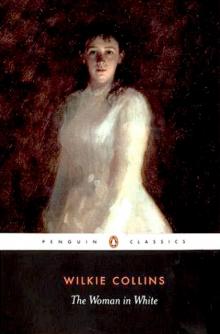 The Woman in White
The Woman in White The Queen of Hearts
The Queen of Hearts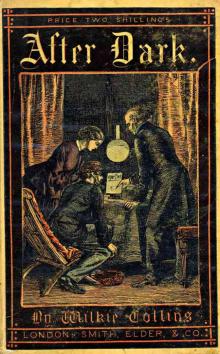 Miss Jeromette and the Clergyman
Miss Jeromette and the Clergyman Man and Wife
Man and Wife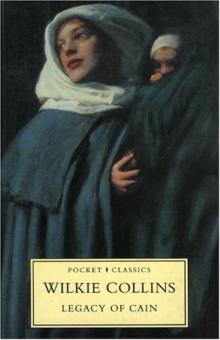 The Legacy of Cain
The Legacy of Cain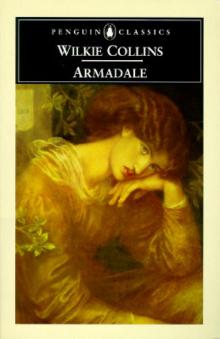 Armadale
Armadale The Frozen Deep
The Frozen Deep John Jago's Ghost or the Dead Alive
John Jago's Ghost or the Dead Alive Poor Miss Finch
Poor Miss Finch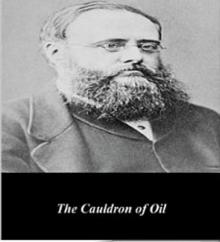 The Cauldron of Oil: A Case Worth Looking At
The Cauldron of Oil: A Case Worth Looking At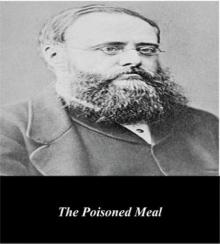 The Poisoned Meal
The Poisoned Meal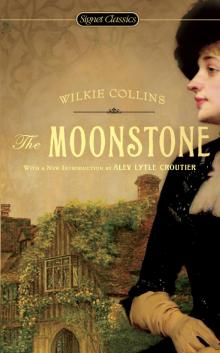 The Moonstone
The Moonstone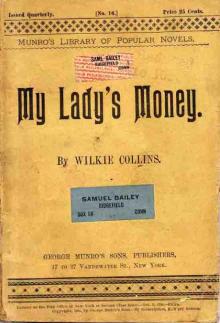 My Lady's Money
My Lady's Money Classic Ghost Stories
Classic Ghost Stories Jezebel's Daughter
Jezebel's Daughter The Devil's Spectacles
The Devil's Spectacles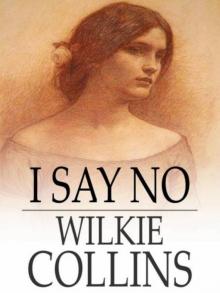 I Say No
I Say No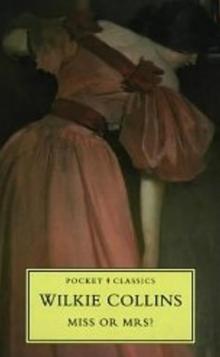 Miss or Mrs.?
Miss or Mrs.?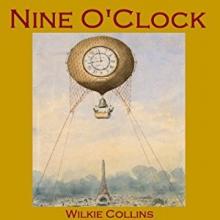 Nine O'Clock
Nine O'Clock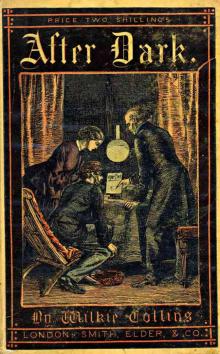 The Lawyer's Story of a Stolen Letter
The Lawyer's Story of a Stolen Letter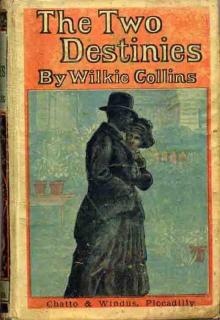 The Two Destinies
The Two Destinies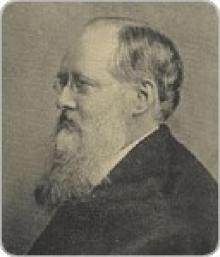 Mr. Percy and the Prophet
Mr. Percy and the Prophet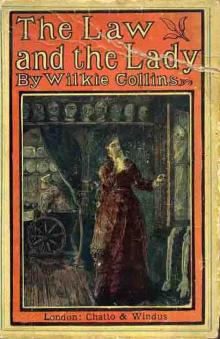 The Law and the Lady
The Law and the Lady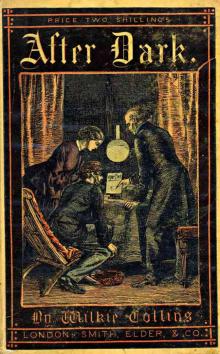 The Nun's Story of Gabriel's Marriage
The Nun's Story of Gabriel's Marriage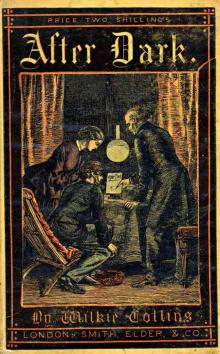 After Dark
After Dark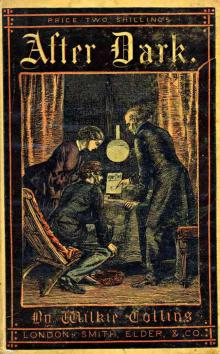 Mr. Captain and the Nymph
Mr. Captain and the Nymph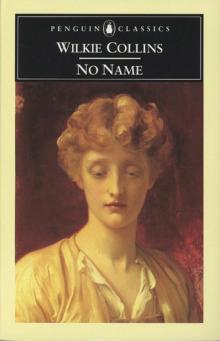 No Name
No Name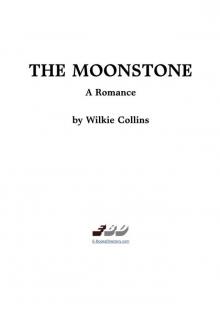 The Moonstone (Penguin Classics)
The Moonstone (Penguin Classics) Antonina
Antonina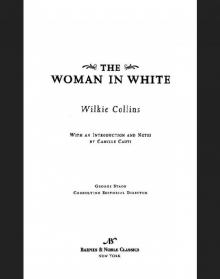 Woman in White (Barnes & Noble Classics Series)
Woman in White (Barnes & Noble Classics Series)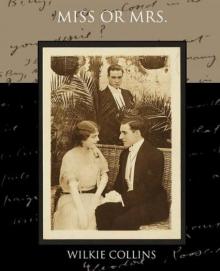 Miss or Mrs
Miss or Mrs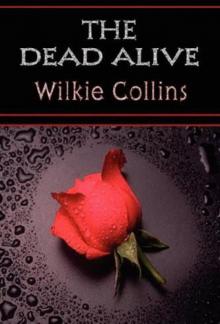 The Dead Alive
The Dead Alive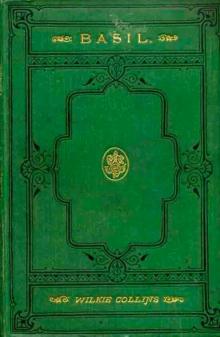 Basil
Basil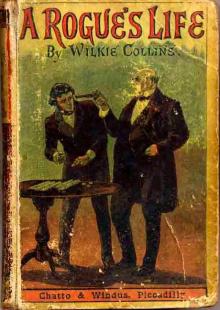 A Rogue's Life
A Rogue's Life The New Magdalen
The New Magdalen Blind Love
Blind Love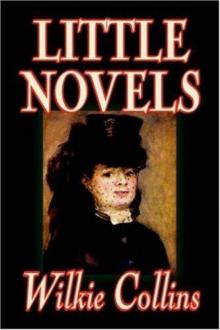 Little Novels
Little Novels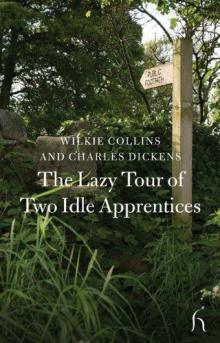 The Lazy Tour of Two Idle Apprentices
The Lazy Tour of Two Idle Apprentices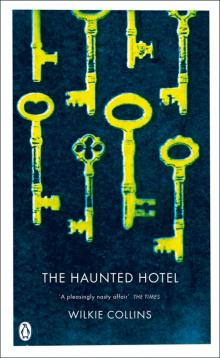 The Haunted Hotel
The Haunted Hotel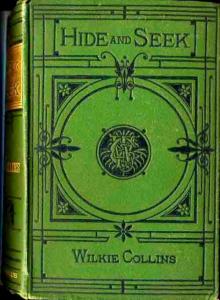 Hide and Seek
Hide and Seek